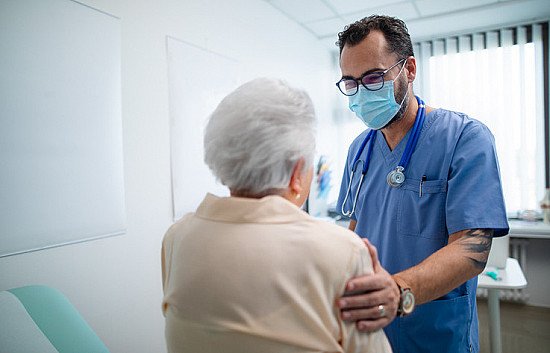When the Touch of a Physician Does not Feel Healing: Managing Medical Treatment When You Have a Physical Touch Sensitivity
The laying on of hands, the comforting pressure of a palm on your back, or the soft tapping of a reflex hammer all convey a closeness that is frequently unsaid in the context of medicine. More than merely a diagnostic tool, therapeutic touch has been used for decades as part of the unwritten contract of care, a silent language that communicates "I am here" between the patient and the caregiver. I recognize you.

What occurs, though, if that contact is not consoling? When you flinch—emotionally, physically, even spiritually—instead of being grounded? Therapeutic touch is becoming less common in a society where flashing screens and diagnostic equipment are used to conduct medical visits more and more. That is a loss to some. Others may find it to be a silent comfort, particularly trauma survivors.
Let us discuss why touch is important, when it isn't, and how to stand up for oneself in a system that is still developing its listening skills.
The Therapeutic Benefits of Touch and Its Diagnostic Use
In medicine, touch is more than just a symbol. It is quite useful. A competent physician can use touch to detect symptoms of disease, such as an enlarged liver, a suspicious lump, or a little change in temperature that indicates an infection.
The emotional aspect of touch also includes the reassuring sensation of a hand on your shoulder and the quiet confirmation that someone is indeed listening. Touch has the ability to communicate empathy, interest, and worry, all of which are not visible on a CT scan.
However, if you have a history of trauma, violence, or medical maltreatment, that same contact may seem intrusive or even triggering.
When the Examination Table Seems Like a Combat Zone
For those who have experienced trauma, especially sexual assault or abuse, a visit to the doctor can be a confusing experience. Exams of the breasts, the pelvis, or even something as seemingly innocuous as a stethoscope beneath your shirt can cause anxiety.
The truth is that you are not alone if that describes you. According to research, trauma survivors frequently steer clear of care entirely out of concern that they will not be respected or heard. In its haste and routine, the system can come out as clinical, aloof, and profoundly disjointed.
However, you are worthy of receiving genuine care that respects your limits and past.
Trauma-Informed Care: An Improved Approach
Trauma-informed treatment is a rapidly expanding medical concept that begins with the bold premise that everyone may be carrying invisible wounds.
Softer tones and increased eye contact are helpful, but they are not the only components of this strategy. The goal is to establish safety. It means that before performing an operation, doctors give an explanation. Rather than assuming, they inquire. Rather than demanding obedience, they encourage cooperation.
Most importantly, they pay attention.
Anything you do not wish to reveal does not have to be revealed. It is sufficient to say, "I would like not to be touched until required." It is very normal to ask for a chaperone during an exam. Before the doctor comes in, a note to the nurse? Completely reasonable.
How to Make Your Upcoming Medical Visit More Tolerable
There are simple yet effective ways to change the dynamic if the thought of being physically inspected makes your skin crawl or your chest tighten.
Here are some tips for getting ready for your upcoming appointment:
Make a statement beforehand. There is no need to overshare; you can let the nurse or medical assistant know that you have preferences regarding physical contact.
Request openness. Before starting the exam, ask your provider to go over each step. It is acceptable to inquire directly, even though many already do.
Bring someone to testify. Having someone else present, whether it be a friend, family member, or medical chaperone, can provide security and comfort, particularly during private examinations.
Remember that you can always say no. Any portion of the exam can be rejected. Complete halt. Your emotional health should not be sacrificed for your care.
It is Alright When Touch Is not Therapeutic
Let us face it: our society is touch-hungry, oversexualizing and undervaluing physical intimacy at the same time. Therefore, it might be confusing when the medical system claims something is for your own good even when it does not feel good.
However, healing is not usually depicted in textbooks. There are moments when it seems like saying "no," "not today." Asking a doctor to take a moment, explain, and then try again with more tact is sometimes necessary.
You are not hard. You are not going overboard. Your sense of security is the most precious thing you possess, and you are defending it.
Conclusion: Therapeutic touch has the potential to be therapeutic; trust is not something that is simply earned. It can be triggering as well. In certain instances, it may be both simultaneously. Modern medicine is still figuring out how to handle such complexity.
Please know that it was not your fault if you have ever left an exam room feeling unheard, unnoticed, or uneasy. Furthermore, things do not have to stay that way forever.
There are healthcare professionals who wish to treat you with respect and presence because they know that healing is about recognizing the person inside the body, not merely identifying the ailment.
And I hope you understand that it is not too much to ask for if you have never had that type of care before. Actually, it ought to be the bare minimum.
What's Your Reaction?




















